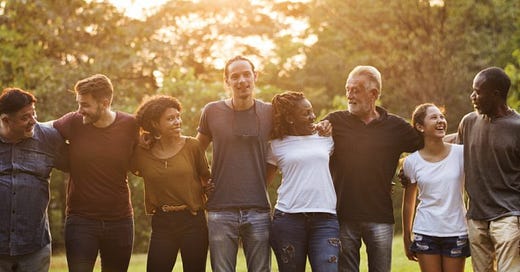Need help now? Have a pressing question? Bring your unique challenges to our LIVE, WEEKLY "Ask Us Anything" support group for Aging, Illness & End-of-Life, and/or our “Peer Support for Death Workers” (both on Zoom).
“I really regret not marrying and having kids. Things would be different right now if I had made different choices.”, John told me with palatable sadness.
John was dying of liver cancer, lived alone, and had few relationships. Contrary to popular belief, having a spouse and children along our side at end-of-life does not make all the problems go away. Even when there are heavily involved loved ones, there is still often a need for some outside help. Having no one though, including no close friendships or involvement in any communities, meant that John was alone in even the most basic decisions. And he was falling for the myth that he would have had all the support he needed if he had just found someone and reproduced.
It’s not the simple.
I told John that I had worked with several clients who had all the things that he regretted not having - multiple kids, a spouse, maybe even a couple partners along the way. And some of them found themselves in his same position. Alone at end-of-life. I saw relief on John’s face. He realized that different decisions may have not guaranteed a different outcome. And while this did not solve his current problem, his regret dissipated a little.
It also became clear to me that John didn’t like people so much. He was mostly kind to me, but as I asked him about extended family and friends, he had an excuse for how and why each relationship eventually dissolved. They didn’t do this…they didn’t do that. So he eventually just stopped engaging and lost touch.
Here’s the hard truth…
Support doesn’t just magically appear at end-of-life, even when we have made the big choices to have a partner and kids. If we are hoping for support during this transitional time, we must foster our relationships early and often - all of them. We should make the phone calls regularly. Offer our help when we can. Share our vulnerability with them. Share a meal. Hold space for them and actively listen without offering unsolicited advice. Put “fostering our relationships” on the calendar of our busy lives.
And also know…
Even if we’ve done all the right things, support at end-of-life may look different than what we had hoped. Even in the best of situations, people have boundaries and limitations. I have been witnessed to very loving, close parent-child relationships, but the child is simply not a caregiver. Care giving is not in their wheelhouse and most of those tasks need to be hired out. However, the child may still be there as listening ear and help with decisions. It may not fulfill the fantasy of the person dying, but it’s an important offering. I’ve also seen friends who have happily stepped in as the primary care giver because they had the capacity to do so and wanted to give back to a person who had given them so much.
I’m not saying it’s easy - mainting relationships is some of the hardest work. Sometimes I find myself neglecting this area, not because I don’t like the person, but because I’m just tired from life and the last thing I have energy for is to return a text or make a phone call. And that’s ok, now and again. We all have those moments when we want to climb under a blanket and pretend that we don’t need anyone. We may be able to get away with this for a little awhile, when we are young and able, physically and cognitively competent. But there will likely be time of need, even if it only comes at end-of-life. And although we won’t be able to control whether are not someone will have the capacity to show up for us how we want them to, we can try harder to foster our relationships along the way.







